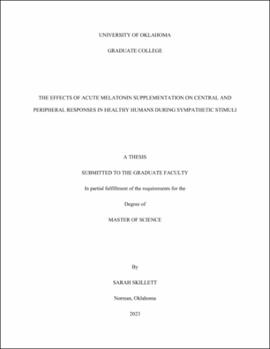| dc.description.abstract | There is evidence that melatonin has more functions other than regulating sleeping tendencies such as anti-hypertensive and antioxidant functions, however how melatonin exerts these functions is unknown. PURPOSE: To determine if acute melatonin supplementation alters central and peripheral responses to mild hypovolemia at rest and during rhythmic exercise in healthy humans. METHODS: 8 healthy young adults (23±3, 3 females) participated in a randomized, single blind, crossover protocol. Subjects ingested 5 mg of melatonin (MEL) or placebo (mint water) as a sublingual spray 30 minutes before data collection. Cardiovascular variables (SV, TPR, and HR) measured by ECG and finger photoplethysmography, and vascular hemodynamics (FBF and FVC) measured by doppler ultrasound during –20mmHg stimulus from LBNP and rhythmic handgrip exercise. Paired t-tests were performed to compare data between conditions, significance was set as p ≤0.05. RESULTS: Data are presented as mean±SD. No significant differences were found for SV (P:102.80±31.08 vs M:102.08±21.68, p=0.78,r=0.07), TPR (P:102.00±31.57 vs M:102.16±18.53, p=0.89,r=0.04), FBF (P:217.70±112.41 vs. M: 213.99±148.39, p=0.89,r=0.04), or FVC (P:180.47±93.19 vs. M:179.40±119.93, p=0.67,r=0.11) during exercise, except a significant decrease in HR in the MEL condition (P:74.58±10.09 vs M: 68.69±7.79, p=0.03,r=0.56). There were no significant differences found for SV (P:87.28±24.61, vs. M:91.02±23.24, p=0.58,r=0.14), TPR (P:112.70±35.43 vs. M:112.11±23.33, p=1.00,r=0.00), FBF (P:224.48±119.69 vs. M:229.46±147.33, p=0.48,r=0.18), or FVC (P:180.95±88.93 vs M:188.67±119.73, p=0.58,r=0.14) during exercise with LBNP except a significant decrease in HR in the MEL condition (P:78.08±11.76 vs. M:71.06±9.34, p=0.05,r=0.49). CONCLUSION: Our data indicates that melatonin does not alter central or peripheral responses in healthy humans during sympathetic stimuli. | en_US |
